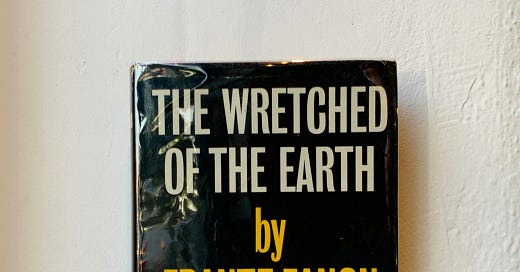review #03: "The Wretched of the Earth" by Frantz Fanon
Reading this book changed how I see the world. Maybe that’s to be expected for a white Westerner, but it’s true nevertheless. What changed is that I no longer see my own world in a vacuum: the world I grew up in and have lived in my whole life, the Western world of social progress and technological advancement, is not the sole and inevitable consequence of European intellectual might. It is the product of more than five centuries of material extraction from the rest of the world. This fact is often concealed euphemistically within the term “trade.” But, as Fanon writes,
“Europe is literally the creation of the Third World. The riches which are choking it are those plundered from the underdeveloped peoples.”
What makes The Wretched of the Earth so powerful is Fanon’s grounding of colonial history from the perspectives of the conquered in a psychological analysis of the way colonized bodies contort themselves to adapt to the inhuman conditions placed upon them. The first several sections are stirring accounts of how revolutions play out, their many pitfalls, and what the end result should be if we are to truly decolonize the world. The final section takes all this thinking and supercharges it with a review of the psychological toll the colonial system takes on those that find themselves in it, colonist and colonized alike. The ingenuity, the progress, the perfection that the Western elite vaunt as their birthright are revealed to be in all actuality a curse they seem destined to reenact with every generation. As a Westerner reading Fanon’s work, I find the note from Sartre’s introduction most instructive, namely that
“We, too, people of Europe, we are being decolonized: meaning the colonist inside every one of us is surgically extracted in a bloody operation.”
Decolonization does not just mean freeing the colonized peoples of the Earth: it means ridding the whole world, the West included, from the wretched debasement of humanity that is the colonial system.
I should point out none of this is news to me, nor is colonialism a story which until now I was blissfully unaware of, as some readers might feel. But this book is not some dry historical treatise on global economics. It is a whole confrontation in a single work, and its anger, its galvanizing potential on the mind and soul, is undeniable. One can know things, but to react to information in a visceral way takes the kind of framing only a talented writer is capable of. Fanon’s voice, in turns exasperated, indignant, and optimistic, is extremely strong. Even if you think you know what decolonization is all about, give this book a read. It may just dislodge that carefully concealed colonist within you.
** For classics works like this, and for certain non-fiction books generally, there will be no score in my review. **



